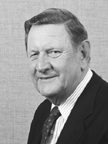
Founders Day kicks off 125th Anniversary Celebration
Ruffner Medal awarded to Garvin
Moseley Awarded 1997 Alumni Distinguished Service Award
Coleman receives Alumni Distinguished Service Award
Zallen consults for "Chicago Hope"
Early admission applications up
Hypertext poetry anthology jumps
Student named USA Today Academic All-American
Highty Tighties play in inaugural parade
McGrath inducted into Plastics Hall of Fame
Tech senior named Cheerleader of the Month
Pamplin Scholarships to fund students from every Virginia high school
Cadets flying high
Ag faculty win international prize
Twins attracted to class of 2000
Exchange launched with university in Singapore
Psychologists awarded $1.2 million to study fire victims
End-plate patent makes 19th for forestry
Center for Scientific Visualization of Organizations started
DISTINCTIONS
This year's Founders Day, Virginia Tech's annual celebration of the achievements of its faculty, students, and staff, marked the beginning of the university's 125th Anniversary Celebration: 1872-1997. On March 19, 1872, Virginia Governor Gilbert C. Walker signed the bill creating the Virginia Agricultural and Mechanical College, now Virginia Tech. At April 4 Founders Day's festivities this year, the university kicked off its anniversary celebration. Throughout the year, the university anniversary committee is sponsoring a series of distinguished alumni lectures. The first, on April 15, featured an address by Virginia Tech alumnus and Nobel Prize winner Robert C. Richardson.
Back to Contents

The Board of Visitors has selected Clifton C. Garvin (chemical engineering '43, M.S.) as the recipient of the 1997 William H. Ruffner Medal, the university's highest honor.
After graduation from Virginia Tech, Garvin served for three years with the Army Corps of Engineers throughout the Pacific. Then he returned to Blacksburg to earn a master's degree in chemical engineering.
Garvin rose through the ranks at Exxon, starting out as a process engineer in the oilfields of Louisiana in 1947. He was elected chairman of the board and chief executive office of the giant petroleum company in 1975, a position he held until his retirement as chairman emeritus in 1986.
Garvin served as the rector of the Virginia Tech Board of Visitors from August 1991 until June 1996. He has been an active member of the board of directors of the Virginia Tech Foundation and served the university as a member of the College of Engineering Committee of 100 and the Ut Prosim Society.
Garvin currently serves as co-chairman of the Campaign for Virginia Tech.
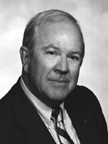 William W. "Bill" Moseley (building construction '51) was honored with a 1997 Alumni Distinguished Service Award for his lifelong support of the university at the local, state and national levels. Moseley is the founder of the Richmond architectural/engineering firm, the Moseley Group, which grew to employ more than 60, with billings of nearly $1 billion. President Ronald Reagan honored Moseley in 1983 with Virginia's Small Business Person of the Year Award. Moseley now is chairman emeritus of the board of the firm, now known as the Moseley, Harris, McClintock Group, and president of the Moseley Development Company.
William W. "Bill" Moseley (building construction '51) was honored with a 1997 Alumni Distinguished Service Award for his lifelong support of the university at the local, state and national levels. Moseley is the founder of the Richmond architectural/engineering firm, the Moseley Group, which grew to employ more than 60, with billings of nearly $1 billion. President Ronald Reagan honored Moseley in 1983 with Virginia's Small Business Person of the Year Award. Moseley now is chairman emeritus of the board of the firm, now known as the Moseley, Harris, McClintock Group, and president of the Moseley Development Company.
Moseley received the CASE Volunteer Award in 1993 in recognition of his contributions to Virginia Tech from the national Council for the Advancement and Support of Education. Moseley was elected to the board of the Richmond chapter of the Virginia Tech Alumni Association in the 1970s and served two terms as chapter president, increasing membership from 300 to 800 alumni. He became the alumni association's national president in 1990 and assisted in the association's transition from an independent, private corporation to an important component of the university's structure.
Other initiatives included establishing a legislative affairs committee to communicate the university's needs to legislators.
In recent years, he has served on the Advisory Board of the College of Architecture and Urban Studies. His architecture firm has hired many Virginia Tech graduates and provided many internships for students.
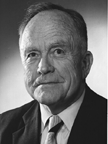
Charlotte, N.C., businessman Mace Coleman (business administration '52), was also selected to receive a 1997 Alumni Distinguished Service Award.
A Lynchburg native, Coleman dropped out of school at age 15 to join the Marines. After a three-year tour of duty, he returned home to earn his high-school diploma, then came to Virginia Tech. He did graduate work at the University of Virginia and Harvard.
During his student years, Coleman made part of his living selling Fuller brushes. Thirty years later, the National Account Marketing Association named him Marketing Executive of the Year in 1986.
Coleman spent 10 years working for National Gypsum in California. While there, he served as president of Virginia Tech's Northern Los Angeles Alumni Chapter. When National Gypsum moved its headquarters to Charlotte, Coleman, along with some partners, bought Gypsum's Gold Bond wallboard subsidiary. He became president and chief executive officer of Gold Bond Building Products, serving for 10 years. He later formed MTC Investments, serving as chairman and president.
Coleman was elected to the board of directors of the Virginia Tech Alumni Association in 1989. He has long been the alumni association's main contact in Charlotte, and currently serves as chairman of the Charlotte regional efforts for the Campaign for Virginia Tech.
On Feb. 10, when the television program "Chicago Hope" aired a segment dealing with gene therapy in connection with a brain tumor, the expert advice of a Virginia Tech professor was a part of the unseen background.
Jennifer Levin, the story editor of "Chicago Hope," consulted Doris Zallen concerning the human issues behind gene therapy for the television drama. Zallen, an associate professor of science and technology studies and humanities in the Center for Interdisciplinary Studies at Virginia Tech, has been studying ethical issues related to gene therapy for some years.
Levin, who is a physician, had heard about the therapeutic use of so-called "suicide genes" (which insert themselves into cancer cells, marking the cells for extermination with a powerful new drug) and thought that sounded like a dramatic idea for the program. She knew of Zallen through her membership on the Recombinant DNA Advisory Committee of the National Institutes of Health, where Zallen has been involved in devising policies about the use of gene therapy in the United States. Zallen's field of expertise includes not only the way people make decisions in times of crisis, but also patient's-rights and informed-consent issues.
Zallen was concerned that the show might make the general public think gene therapy is a wonderful new treatment already available to them, when it isn't. "It's experimental," she says.
Choices about experimental therapies must be described in such a way that the patient is not misled, Zallen says. "People must make the decision {to have the therapy or not}, not the doctor."
The strong demand for admission to Virginia Tech continues for the 1997-98 school year, with applications for early admission up 32 percent from last year. The university received 1,856 applications for early admission, compared with 1,398 last year.
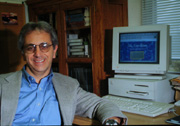
An innovative way of linking technology and poetry has been initiated at Virginia Tech.
To read English professor Edward Falco's hypertext anthology, The New River, you must be both computer and poetry literate. The poetry journal can be accessed by computer only, and the reader is allowed to control the direction of the flow. All paths lead to the core of the poem, but the reader can chose which way to get there.
"On the computer screen, words, video, visual art, and sound can be easily integrated by one person sitting alone in front of a computer screen," he says. Falco wanted to do "something different with language, make it jump." The process starts when the reader picks a work, opens it, and starts clicking on key words that lead into another section of the work. The choice of words the reader decides to link allows for the creation of a unique version of the original work by the reader.
There is a traditional way of storytelling that is linear and structured, Falco says. But hypertext poetry is without fixed sequences of words and without predetermined endings. He doesn't see them as being in competition. The work of two American writers is displayed on the site: David Herrstrom's "To Find the White Cat in the Snow" and "fleshthresholdnarrative" by Eugene Thacker.
J. Michael Schmidt, a Virginia Tech junior, is one of 20 U.S. undergraduates selected for USA Today's 1997 All-USA College Academic First Team. The $2,500 award is based on a student's individual intellectual endeavors and leadership. Schmidt, a biology major from Herndon, is researching how to use sewage sludge as a fertilizer without contaminating ground water. He plans to be a restoration ecologist.
Schmidt has received numerous awards at Virginia Tech, including the Morris Udall and Barry Goldwater Scholar awards and the Gamma Sigma Delta Sophomore of the Year Award in the College of Agriculture and Life Sciences.
He designed and runs the Science Saturdays Program, an educational program for children, and participates in the Environmental Science Student Organization, Moderated Study Group Program, University Honors Associates, Adopt-a-Spot, Omicron Delta Kappa, and Golden Key National Honor Society.
 The strains of "Tech Triumph" echoed through the streets of Washington, D.C., as Virginia Tech's Highty Tighties marched in President Bill Clinton's inaugural parade in January. This was the ninth inaugural parade for the Tech band, one of 50 bands selected from across the nation for the event.
The strains of "Tech Triumph" echoed through the streets of Washington, D.C., as Virginia Tech's Highty Tighties marched in President Bill Clinton's inaugural parade in January. This was the ninth inaugural parade for the Tech band, one of 50 bands selected from across the nation for the event.
The last time the Highty Tighties marched in an inaugural parade was in 1981. "We were glad to have a chance to do it again in this millennium," says band leader Maj. George McNeill.
In addition to the university fight song, the band played two marches by John Philip Sousa.
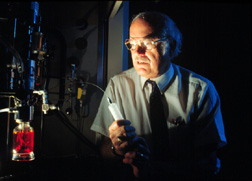
Professor James McGrath is one of nine scientists, innovators, and industry leaders recently chosen to become members of the Plastics Hall of Fame.
McGrath, who is a University Distinguished Professor of Chemistry and co-director of the Polymer Materials and Interface Laboratory, is also director of the National Science Foundation Science and Technology Center at Virginia Tech.
Before joining Virginia Tech as a professor in 1975, McGrath had spent nearly two decades working as an industrial research scientist developing new polymers and processing techniques. He then applied this knowledge in a 20-year second career as a major author and academic leader in polymeric materials, which include rubber, plastics, textiles, and adhesives. Over that span, he has conducted innovative courses on polymer chemistry for student, government, industrial, and international audiences.
McGrath is the co-author or editor of six books on block copolymers, polymerization technology, organosiloxane copolymers, and polyimides, as well as more than 300 technical papers. He initiated the first nationally offered short courses in polymer chemistry.
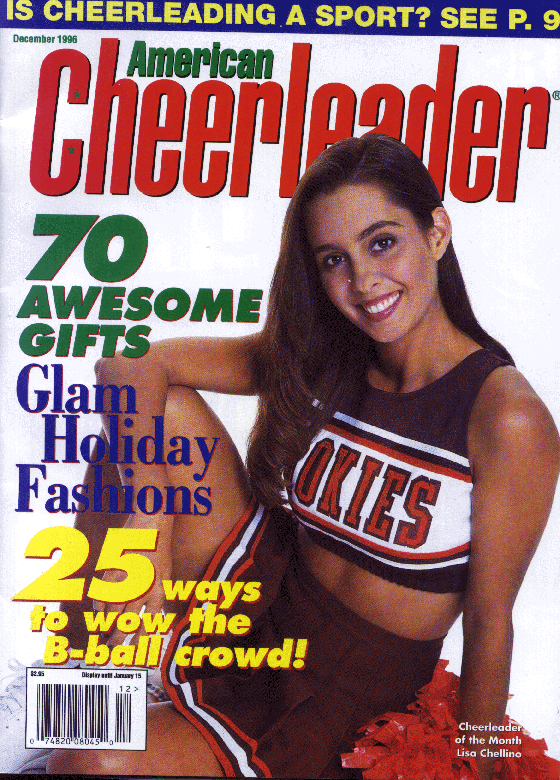 She was part of the Virginia Tech squad that attracted national recognition after placing fourth in the 1996 National Cheerleading Association finals. She was named American Cheerleader magazine's Cheerleader of the Month for December. And Lisa Chellino (political science and sociology '97) could be the next Cheerleader of the Year.
She was part of the Virginia Tech squad that attracted national recognition after placing fourth in the 1996 National Cheerleading Association finals. She was named American Cheerleader magazine's Cheerleader of the Month for December. And Lisa Chellino (political science and sociology '97) could be the next Cheerleader of the Year.
Chellino may be hanging up her pompoms come May, but not without leaving a mark on the cheerleading world. She began cheering for the youth association before the sixth grade and in the ninth grade at Chantilly High School, a broken ankle didn't stop her from making the team.
When the Tech cheerleading team ranked in the finals, the sponsoring association's magazine asked Tech squad members to send in resumes for the Cheerleader of the Month cover contest. Chellino was chosen for her cheerleading ability, coach's recommendations, academic achievement, and community service. They also liked her smile.
"It was great to receive such recognition. Our cheerleading program doesn't get any scholarships. This publicity helped recognize all the hard work we have put into it," Chellino says.
She received a trunk load of cosmetics and became one of seven finalists for Cheerleader of the Year honors, which include a $1,000 scholarship and other prizes.
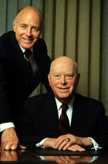
Alumni Robert Pamplin Sr. and Robert Pamplin Jr., a father and son whose Virginia roots predate the Civil War, have made a $3.5-million gift that will help open doors to Virginia Tech to a qualified student in each of Virginia's high schools every year.
The Pamplins' gift, matched by an equal amount from the Virginia Tech Foundation, creates the Pamplin Leadership Award, a one-year, $1,000 Virginia Tech scholarship given to a qualified graduating senior in each of Virginia's almost 300 public high schools. The gift also creates the Pamplin Scholar Award, a three-year scholarship covering tuition and fees at Virginia Tech. The Pamplin Scholar will be selected from the Pamplin Leaders prior to his or her sophomore year, with plans for 12 full scholarships by 2007.
The gift from the former chief executive of the Georgia Pacific Corp., Robert Pamplin Sr. (business administration '33) and his son, Robert Jr., currently president of the R.B. Pamplin Corporation, was announced at Virginia Tech's Founders Day, April 4.
The first group of scholarship recipients will be selected for the 1998-99 academic year.
Applicants must have a 3.75 grade point average, rank in the top 10 percent of their graduating classes, and demonstrate leadership and service experience. Applications can be made by students, guidance counselors, or school principals. Forms will be distributed to school counselors this fall.
The Pamplin family has deep roots in Virginia. The senior Pamplin grew up in Dinwiddie County and was recognized in 1976 by the Virginia Press Association as "Virginian of the Year." He helped build Georgia-Pacific Corp. into a wood and paper giant before he retired in 1975.
Robert Jr. also attended Virginia Tech, has earned eight degrees including two doctorates, authored 12 books, and become an ordained minister. He received the Distinguished Leadership Medal from the Freedoms Foundation.
With this gift the Pamplin family contribution to Virginia Tech totals $28 million. The university's business school is named in their honor. The Pamplins also created the Pamplin Park Civil War Site near Petersburg.
Of the 13 Virginia Tech cadets who applied for U.S. Air Force pilot and navigator school, all 13 were selected. The cadets' applications were reviewed with those from 143 other air force units from across the nation by a panel of officers at the U.S. Air Force National Headquarters at Maxwell Air Force Base.
Virginia Tech gave out more pilot wings this year than VMI and had a higher wing-selection rate than both the Citadel and Texas A and M, according to Col. "Rock" Roszack, a navigator and professor of aerospace studies at Virginia Tech.
George Norton and Jeffrey Alwang, faculty members in agricultural and applied economics, have won first prize in an essay competition sponsored by the International Food Policy Research Institute.
The competition sought practical approaches to measuring the benefits of policy-oriented agricultural social-science research. Norton and Alwang examined research projects that affected policy change in the Amazon and the Philippines.
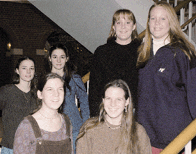 If you think you're seeing double on campus, it may be because the class of 2000 includes 20 sets of twins. Fifteen sets are from Virginia.
If you think you're seeing double on campus, it may be because the class of 2000 includes 20 sets of twins. Fifteen sets are from Virginia.
The university's diversity accommodates a variety of interests and gives matched pairs the option of losing their twin identities on the large campus.
Mirror-image twins Aaron and Ben Green of Farmville, Va., don't room together and seldom see one another. "Ben chose Virginia Tech first, and I think he was kind of disappointed that I came here, too. After living together for 18 years, we got tired of being together all the time. Now we only see each other when we want to," says Aaron. He adds that he enjoys having his own identity instead of being known as one of the twins.
Annie Bauer of Richmond, who is majoring in interior design, never considered not sharing a room with her twin Amie, a communication studies major. They also have an older sister on campus.
Leslie Lewendowski, an architecture major from Pittsburgh, and her twin and suitemate Lisa, chose to come to Virginia Tech because of the national reputations of the engineering and architectural colleges. "My sister and I have very different interests, but Tech had something for both of us," says Leslie.
PICTURED: Identical twins (front) Rebecca (l) and Natalie Sutherland of Warrenton, Va.; Back, left to right: Amie and Annie Bauer of Richmond, and Britton and Rachel Julian of Camden, S.C.
Virginia Tech has established a formal exchange agreement with Nanyang Technological University in Singapore that enables up to two MBA students from each school to study for a semester at the other institution. The first students will be exchanged this coming fall.
The agreement is primarily a result of the efforts of management science and information technology professor Philip Huang, who has led students on study trips abroad and is active in other college efforts to prepare students for global business challenges.
Nanyang is an excellent partner for an exchange program, Huang says, because its business school emphasizes international business and has developed close links with foreign companies located in Singapore. Many of the faculty at Nanyang have close ties with institutions elsewhere in Asia, including Malaysia, Indonesia, Thailand, and China.
The National Institute of Mental Health (NIMH) has awarded two Virginia Tech psychology professors a $1.2-million grant to study the impact of residential fires on children, adolescents, and their parents, with the eventual goal of developing treatment programs for the victims of fires.
Russell Jones has been doing research in this area for 20 years, primarily helping children avoid being injured in a fire; Thomas Ollendick has been doing research on anxiety disorders and the fears children experience in these unexpected events.
In the newly funded, longitudinal study they will look at whether the victims developed post-traumatic-stress disorder, depression, or other symptoms of psychopathology. Jones and Ollendick also will examine the relationship between the way the parents function during the trauma and the way the children function. "If parents respond poorly and develop symptoms," Jones said, "it is likely the children will."
Documenting the consequences of fire-related disasters on children and their families in research supported by the NIMH grant will enable Jones and Ollendick to develop better treatment strategies to help the children and their families recover from the fires.
E. George Stern, Earle B. Norris Research Professor Emeritus of Wood Construction of Virginia Tech's Department of Wood Science and Forest Products, was granted a U.S. patent on an "end plate for railway crossties, scaffolding planks, and other wood products and methods of use."
His patent makes the 19th for the College of Forestry and Wildlife Resources, which works closely with the wood products industry in research and development.
By end-plating crossties and other wood products with Stern's toothed metal plate, tie end-splitting is prevented and tie life is considerably increased. As a result, wood ties become more economical than concrete and steel crossties.
Virginia Tech has received $600,000 from AT and T to support a new center that will research the latest techniques to analyze the masses of data that the telecommunications company processes.
The new AT and T Center for the Scientific Visualization of Organizations began operations in the Pamplin College of Business in January, under the direction of management professor Steve Markham.
AT and T's billing operations faces the monumental challenge of keeping track of each call message that crosses its long-distance lines and ensuring that each message ultimately becomes a bill to the proper customer account. The company's Consumer Process Operation Center (CPOC), established to collect and monitor data from its extensive billing, is simply overwhelmed with the quantity and detail of information, Markham says.
The new research center will help AT and T analyze its data through "scientific visualization," a computer-based technique that enables enormous amounts of information to be displayed in full-motion, three-dimensional, color format. While scientific visualization has become a popular research tool in medicine, the technique is still little known among business researchers. The new center, he hopes, will change that.
"Historically, the quality movement focused on just one measure at a time, such as defects. Through visualization processes, we hope to capture, in one glance, multiple measures of system performance that will paint a more comprehensive picture of how we are performing," says Cada Grove, district manager of CPOC.
The center expects to support the research of faculty and graduate students from such disciplines as organizational science, change management, management science, information technology, accounting, engineering, statistics, and graphic arts.
The Virginia Tech Corps of Cadets is the only program in the nation where cadets can earn a minor in leadership. Through the years, it has produced seven Congressional Medal of Honor recipients, hundreds of generals, and countless corporate officers.
Virginia Tech's psychology department and psychology professor Thomas Ollendick have been ranked 10th and 11th, respectively, in an Association for Advancement of Behavior Therapy list of top institutions and researchers in behavior analysis and behavior therapy from 1974-1994. The rankings were determined by the number of articles published in key applied behavioral journals.
The Virginia Tech Chapter of the Public Relations Student Society of America has been named outstanding chapter in the nation. The group hosts events and fund-raisers and runs its own public relations firm, PR Productions.
Home | News | Features | Research | Philanthropy | President's Message | Athletics | Alumni | Classnotes | Editor's Page